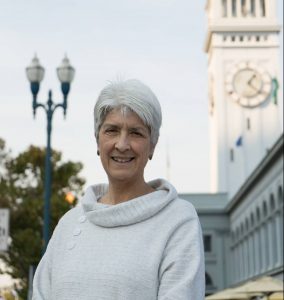The Doctor is In: The California Rehabilitation Tax Credit – Status, Updates, and Q&A
In 2019, Senate President pro Tempore Toni G. Atkins introduced SB 451, a bill to create a state historic tax credit. The bill was passed with unanimous approval from the Senate and Assembly. The legislation built on work CPF did in 2014, with the collaboration of the American Institute of Architects, California Council (AIACC), to promote tax credits.
Feaures of SB-451 included:
- A state 20% tax credit for the rehabilitation of historic structures.
- A 5% bonus for certain projects, such as affordable housing.
- Use of the credit by income-producing properties and owner-occupied buildings.
- An annual aggregate cap ($50,000,000) on the tax credit program, with
- $10 million set aside for residential and smaller projects.
Although the bill, passed, the real work begins. In this free online panel, you'll learn from some of the participants and advocates in the effort on the latest status of the tax credit, including new developments. You will have time to ask the panelists your questions at the end of the presentations.
Speakers
 Tony Gonzalez, London & Gonzalez Advocacy. Tony Gonzalez is a legislative advocate with 32 years of experience in public policymaking in Sacramento. He has represented a wide variety of clients in the financial services, telecommunications, transportation, and environmental services sectors, as well as various local governments, tribal governments, and nonprofit organizations.
Tony Gonzalez, London & Gonzalez Advocacy. Tony Gonzalez is a legislative advocate with 32 years of experience in public policymaking in Sacramento. He has represented a wide variety of clients in the financial services, telecommunications, transportation, and environmental services sectors, as well as various local governments, tribal governments, and nonprofit organizations.
Prior to founding London & Gonzalez Advocacy, Mr. Gonzalez was a managing director for Grayling, a public relations/affairs based in London. He previously served as Deputy Commissioner for Policy, Research and Special Projects for the California Department of Insurance. At the California Department of Insurance, Tony directed the department’s initiative in seeking restitution for the families of Holocaust victims whose property and life insurance benefits purchased during the Nazi era were unlawfully confiscated by European insurance companies. This initiative ultimately led to the creation of the International Commission on Holocaust Era Insurance Claims.
Mr. Gonzalez was also Staff Director for the Assembly Republican Caucus, where he coordinated policy development and analysis for the members of the caucus. Tony was previously policy consultant for the Assembly Natural Resources Committee, Assembly Water, Parks and Wildlife Committee, and Assembly Environmental Safety and Toxic Materials Committee for the Assembly Republican Caucus. He was instrumental in the enactment of several statutes relating to the Beverage Container Recycling and Litter Reduction Act of 1986, the Natural Communities Conservation Planning Act of 1991, timber harvesting practices and water rights and various revisions to the California Environmental Quality Act. He also served as Assembly legislative liaison on the California Constitutional Revision Commission in 1996.
Tony is a native Californian with a passion for California history who completed his graduate and undergraduate work at Claremont Graduate School and Claremont McKenna College. He is a Chair of the Board of Trustees for the California Historical Society, a Director of the Board of the Sickle Cell Disease Foundation.
 Cindy Heitzman, Executive Director. Cindy brings sixteen years of experience as the leader of CPF. She previously worked as Building Official and Fire Marshal for the City of St. Helena in the Napa Valley and was the first female president of the Redwood Empire Chapter of Code Officials (2000). Cindy served as the Chair of the California Building Officials’ Historic Codes Committee and has coordinated courses on the use and application of the California Historical Building Code. She served as a commissioner on the California Building Officials Training Institute from 2002 – 2005.
Cindy Heitzman, Executive Director. Cindy brings sixteen years of experience as the leader of CPF. She previously worked as Building Official and Fire Marshal for the City of St. Helena in the Napa Valley and was the first female president of the Redwood Empire Chapter of Code Officials (2000). Cindy served as the Chair of the California Building Officials’ Historic Codes Committee and has coordinated courses on the use and application of the California Historical Building Code. She served as a commissioner on the California Building Officials Training Institute from 2002 – 2005.
![]() Albert Rex is a partner at MHA and serves as the firm’s CEO. Albert’s career has focused on the intersection of historic preservation and real estate, first working with several different non-profits in Massachusetts and New England and then with MHA helping our clients secure state and federal historic tax credits. For the past 24 years, Albert has worked with clients that include developers, non-profit organizations, municipalities, and institutions that have complex historic tax credit, permitting, and zoning issues. He was one of four authors of the original legislation that created the Massachusetts Historic Rehabilitation Tax Credit (MAHRTC) and has consulted on that matter as a technical advisor to Preservation Massachusetts, Inc., the statewide non-profit advocacy organization. He has also actively worked with other states in regards to their state tax credit programs. In addition to administrative duties, Albert provides clients with a unique understanding of the different state tax credit programs, especially in New England, and helps client think through ways to maximize these programs in their projects. He has represented clients in appeals to the National Park Service in Washington, DC and has also worked with the Historic Monuments Program administered by the GSA and regional National Park Service offices.
Albert Rex is a partner at MHA and serves as the firm’s CEO. Albert’s career has focused on the intersection of historic preservation and real estate, first working with several different non-profits in Massachusetts and New England and then with MHA helping our clients secure state and federal historic tax credits. For the past 24 years, Albert has worked with clients that include developers, non-profit organizations, municipalities, and institutions that have complex historic tax credit, permitting, and zoning issues. He was one of four authors of the original legislation that created the Massachusetts Historic Rehabilitation Tax Credit (MAHRTC) and has consulted on that matter as a technical advisor to Preservation Massachusetts, Inc., the statewide non-profit advocacy organization. He has also actively worked with other states in regards to their state tax credit programs. In addition to administrative duties, Albert provides clients with a unique understanding of the different state tax credit programs, especially in New England, and helps client think through ways to maximize these programs in their projects. He has represented clients in appeals to the National Park Service in Washington, DC and has also worked with the Historic Monuments Program administered by the GSA and regional National Park Service offices.
